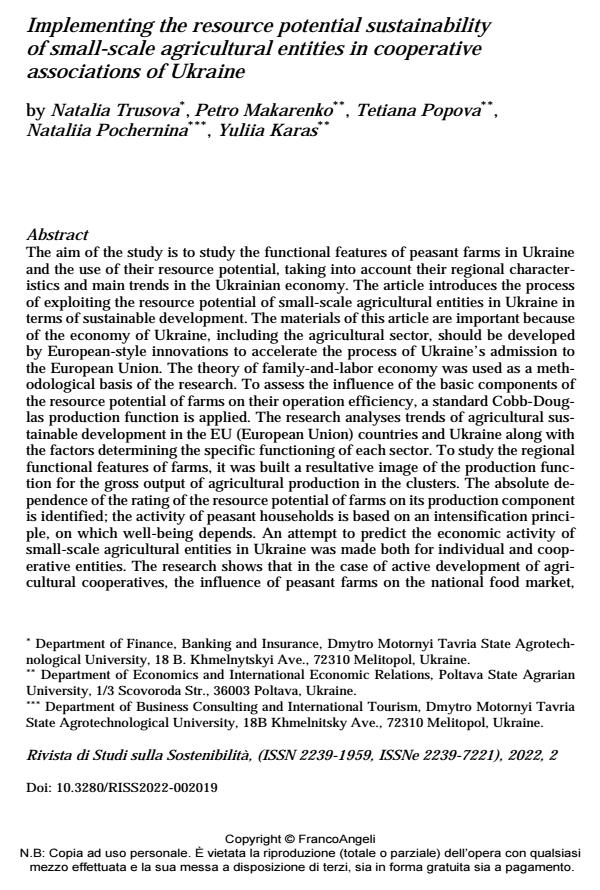Implementing the resource potential sustainability of small-scale agricultural entities in cooperative associations of Ukraine
Titolo Rivista RIVISTA DI STUDI SULLA SOSTENIBILITA'
Autori/Curatori Natalia Trusova, Petro Makarenko, Tetiana Popova, Nataliia Pochernina, Yuliia Karas
Anno di pubblicazione 2023 Fascicolo 2022/2
Lingua Inglese Numero pagine 23 P. 323-345 Dimensione file 289 KB
DOI 10.3280/RISS2022-002019
Il DOI è il codice a barre della proprietà intellettuale: per saperne di più
clicca qui
Qui sotto puoi vedere in anteprima la prima pagina di questo articolo.
Se questo articolo ti interessa, lo puoi acquistare (e scaricare in formato pdf) seguendo le facili indicazioni per acquistare il download credit. Acquista Download Credits per scaricare questo Articolo in formato PDF

FrancoAngeli è membro della Publishers International Linking Association, Inc (PILA)associazione indipendente e non profit per facilitare (attraverso i servizi tecnologici implementati da CrossRef.org) l’accesso degli studiosi ai contenuti digitali nelle pubblicazioni professionali e scientifiche
The aim of the study is to study the functional features of peasant farms in Ukraine and the use of their resource potential, taking into account their regional characteristics and main trends in the Ukrainian economy. The article introduces the process of exploiting the resource potential of small-scale agricultural entities in Ukraine in terms of sustainable development. The materials of this article are im-portant because of the economy of Ukraine, including the agricultural sector, should be developed by European-style innovations to accelerate the process of Ukraine’s admission to the European Union. The theory of family-and-labor economy was used as a methodological basis of the research. To assess the influ-ence of the basic components of the resource potential of farms on their operation efficiency, a standard Cobb-Douglas production function is applied. The research analyses trends of agricultural sustainable development in the EU (European Un-ion) countries and Ukraine along with the factors determining the specific func-tioning of each sector. To study the regional functional features of farms, it was built a resultative image of the production function for the gross output of agricul-tural production in the clusters. The absolute dependence of the rating of the re-source potential of farms on its production component is identified; the activity of peasant households is based on an intensification principle, on which well-being depends. An attempt to predict the economic activity of small-scale agricultural entities in Ukraine was made both for individual and cooperative entities. The re-search shows that in the case of active development of agricultural cooperatives, the influence of peasant farms on the national food market, and well-being will be growing as well as the share of entities engaged in commodity production.
Parole chiave:peasant farms, sustainable development, gross output, resource poten-tial, intensification principle, commodity production.
- КОМПАРАТИВНИЙ АНАЛІЗ ЕФЕКТИВНОСТІ ТА ПОВНОТИ ВИКОРИСТАННЯ РЕСУРСНОГО ПОТЕНЦІАЛУ ТОРГОВЕЛЬНИХ ПІДПРИЄМСТВ: МЕТОДИЧНІ АСПЕКТИ Ірина Парасій-Вергуненко, Ярослав Юрчишин, Костянтин Безверхий, Наталія Грищенко, Каріна Назарова, Наталія Приймак, in Financial and credit activity problems of theory and practice /2023 pp.245
DOI: 10.55643/fcaptp.4.51.2023.4099
Natalia Trusova, Petro Makarenko, Tetiana Popova, Nataliia Pochernina, Yuliia Karas, Implementing the resource potential sustainability of small-scale agricultural entities in cooperative associations of Ukraine in "RIVISTA DI STUDI SULLA SOSTENIBILITA'" 2/2022, pp 323-345, DOI: 10.3280/RISS2022-002019